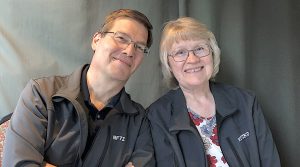
I’m a retired middle school science, math, and STEM teacher. I started teaching in 1985 but only became interested in ham radio after my wife, Kathy KE7ZKD, got her license first to do emergency communication. I became a ham just to spend time with her and see if I could pass the tests–which I did by passing my General in 2009 and became KF7EON.
I’ve been interested in electronics and science ever since grade school, but my interest in amateur radio soared when I went to a summer ARRL Teacher Institute in 2011. After that, as a science teacher and later as a STEM teacher, I tried to expose my students to the joys of radio, electronics, Morse code and satellite tracking and communications. I passed my Extra in 2014 and in May of 2015 I received my current call sign. I retired from teaching in 2019.
I’m on the board of the Valley Radio Club in Eugene, Oregon. I enjoy tinkering building inexpensive antennas and other electronic projects, and doing computer programming.
My contact information is current on QRZ.com
Amateur Radio Is a Hobby That Includes Many Hobbies.Here are 75:
- Antenna building
- Automatic location reporting (APRS)
- Audio signal enhancing
- Awards for Worked All States (WAS), DX Century Club (worked 100 entities–DXCC)
- Balloon launching (w/ radio tracking)
- Basic science
- Battery science and management
- Boy Scouts on the Air
- Communicate on different bands (1.25m, 2, 6, 10, 15, 17, 20, 30, 40, 60, 80, 160)
- Community service
- Computer control systems for radio
- Contesting
- Digital communication
- DXing (long-distance contacting)
- DXpeditions (Operate from rare locations)
- Earth-Moon-Earth (moon bounce) communication
- Electronics
- Emergency communication
- Emergency preparation
- Experimenting
- Family communications
- Fox (or bunny) hunting (direction finding)
- Homebrew transmitters
- Internet Radio Linking Project (IRLP)
- Islands on the Air (IOTA)
- Kit building
- Low Power Transmitting (QRP)
- Marine mobile work
- Mesh Networking
- Mobile radio (bicycle, motorcycle, vehicle, RV, hiking)
- Moon-bounce communication
- Morse code communication
- Neighborhood emergency radio
- Net control
- Net participation
- Pacific Seafarers Net
- Parks on the Air (POTA)
- Physics of antennas
- Physics of electronics
- Physics of radio wave propagation
- Physics of the sun regarding radio propagation
- Physics of waves
- Public service
- Public speaking (at meetings & events)
- QSL card collecting
- Radio astronomy
- Radio control
- Radio Frequency Interference (RFI) Hunting
- Radio repair
- Repeater design and management
- Radio frequency engineering
- Satellite communication
- Search and rescue
- Sherriff assistance
- Short wave listening
- Software design for radio controls
- Solar panel science and management
- Space station communication
- Slow Scan TV (SSTV)
- Study radio spectrum
- Summits on the Air
- Support running & bike races
- Technology
- Tube radio work
- Voice communication
- Volunteer Examiner (VE) testing for new hams
- Volunteering in your club
- Weak signal propagation monitoring (WSPR)
- Wireless internet communication 802.11
- Worked 100 countries award (DXCC)
- Worked all county award
- Worked all provinces award
- Worked all states (WAS) award
- Young Ladies (YL’s) in ham radio groups
- Youth mentoring
![]()
